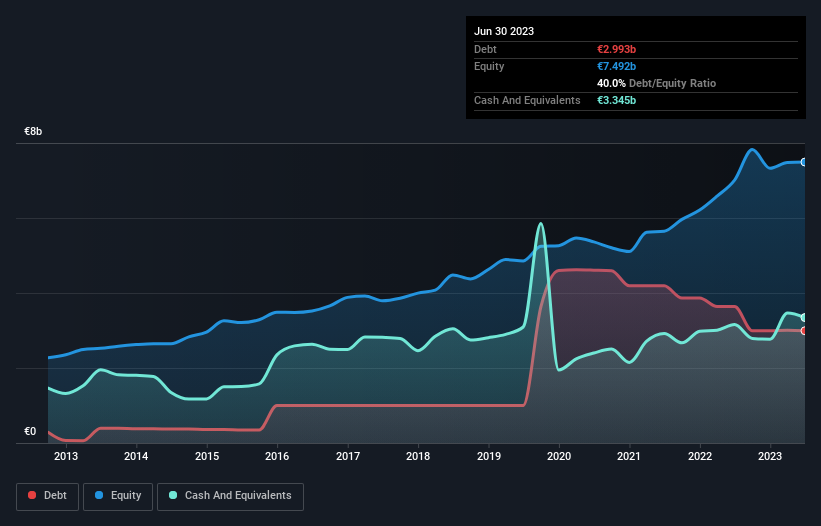
David Iben put it well when he said, 'Volatility is not a risk we care about. What we care about is avoiding the permanent loss of capital.' It's only natural to consider a company's balance sheet when you examine how risky it is, since debt is often involved when a business collapses. We can see that Dassault Systèmes SE (EPA:DSY) does use debt in its business. But is this debt a concern to shareholders?
When Is Debt Dangerous?
Generally speaking, debt only becomes a real problem when a company can't easily pay it off, either by raising capital or with its own cash flow. Part and parcel of capitalism is the process of 'creative destruction' where failed businesses are mercilessly liquidated by their bankers. While that is not too common, we often do see indebted companies permanently diluting shareholders because lenders force them to raise capital at a distressed price. By replacing dilution, though, debt can be an extremely good tool for businesses that need capital to invest in growth at high rates of return. The first step when considering a company's debt levels is to consider its cash and debt together.
See our latest analysis for Dassault Systèmes
What Is Dassault Systèmes's Net Debt?
As you can see below, Dassault Systèmes had €2.99b of debt at June 2023, down from €3.64b a year prior. But it also has €3.35b in cash to offset that, meaning it has €352.2m net cash.

How Strong Is Dassault Systèmes' Balance Sheet?
Zooming in on the latest balance sheet data, we can see that Dassault Systèmes had liabilities of €2.70b due within 12 months and liabilities of €4.03b due beyond that. Offsetting this, it had €3.35b in cash and €1.46b in receivables that were due within 12 months. So it has liabilities totalling €1.93b more than its cash and near-term receivables, combined.
Given Dassault Systèmes has a humongous market capitalization of €49.6b, it's hard to believe these liabilities pose much threat. Having said that, it's clear that we should continue to monitor its balance sheet, lest it change for the worse. Despite its noteworthy liabilities, Dassault Systèmes boasts net cash, so it's fair to say it does not have a heavy debt load!
The good news is that Dassault Systèmes has increased its EBIT by 2.1% over twelve months, which should ease any concerns about debt repayment. When analysing debt levels, the balance sheet is the obvious place to start. But it is future earnings, more than anything, that will determine Dassault Systèmes's ability to maintain a healthy balance sheet going forward. So if you're focused on the future you can check out this free report showing analyst profit forecasts.
Finally, a company can only pay off debt with cold hard cash, not accounting profits. Dassault Systèmes may have net cash on the balance sheet, but it is still interesting to look at how well the business converts its earnings before interest and tax (EBIT) to free cash flow, because that will influence both its need for, and its capacity to manage debt. Happily for any shareholders, Dassault Systèmes actually produced more free cash flow than EBIT over the last three years. That sort of strong cash conversion gets us as excited as the crowd when the beat drops at a Daft Punk concert.
Summing Up
While it is always sensible to look at a company's total liabilities, it is very reassuring that Dassault Systèmes has €352.2m in net cash. The cherry on top was that in converted 125% of that EBIT to free cash flow, bringing in €1.4b. So we don't think Dassault Systèmes's use of debt is risky. Over time, share prices tend to follow earnings per share, so if you're interested in Dassault Systèmes, you may well want to click here to check an interactive graph of its earnings per share history.
When all is said and done, sometimes its easier to focus on companies that don't even need debt. Readers can access a list of growth stocks with zero net debt 100% free, right now.
New: Manage All Your Stock Portfolios in One Place
We've created the ultimate portfolio companion for stock investors, and it's free.
• Connect an unlimited number of Portfolios and see your total in one currency
• Be alerted to new Warning Signs or Risks via email or mobile
• Track the Fair Value of your stocks
Have feedback on this article? Concerned about the content? Get in touch with us directly. Alternatively, email editorial-team (at) simplywallst.com.
This article by Simply Wall St is general in nature. We provide commentary based on historical data and analyst forecasts only using an unbiased methodology and our articles are not intended to be financial advice. It does not constitute a recommendation to buy or sell any stock, and does not take account of your objectives, or your financial situation. We aim to bring you long-term focused analysis driven by fundamental data. Note that our analysis may not factor in the latest price-sensitive company announcements or qualitative material. Simply Wall St has no position in any stocks mentioned.
About ENXTPA:DSY
Flawless balance sheet with proven track record.
Similar Companies
Market Insights
Community Narratives



